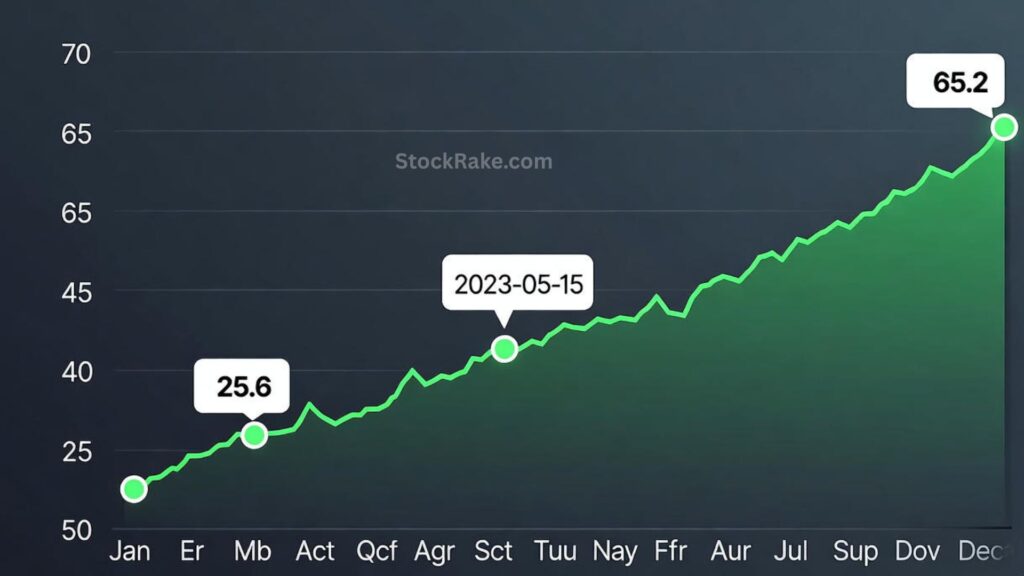If you’ve ever flipped through CNBC or scrolled past a finance headline on social media, you’ve almost definitely seen the phrase “earnings report” tossed around with this weird mix of excitement and dread. It’s like the stock market’s version of a pop quiz. And even if you’re not the type who follows every little market hiccup, earnings reports matter way more than most people realize.
Whether you’re new to investing or still figuring out why your portfolio jumps around for no apparent reason, having at least a decent handle on earnings is honestly one of the most useful things you can do. These quarterly reports are kind of the heartbeat of the market. They can send stocks shooting up, sliding down, or doing weird zig-zag things that make no sense unless you understand what’s behind them.
So let’s break down the whole concept in a way that doesn’t feel like an accounting textbook. No jargon for the sake of jargon. Just the real-world stuff that actually helps.
1. What Are Earnings?

Alright, let’s get the simplest part out of the way. “Earnings” is just a fancy word for profit. Seriously. That’s it. It’s the money a company actually keeps after paying for everything it had to pay for — employees, electricity, rent, marketing, whatever software subscriptions they forgot to cancel last year.
There’s a basic formula:
Revenue – Expenses = Earnings (Net Income)
People will throw around terms like “net income,” “profit,” “bottom line,” but they’re all pointing to the same idea. It’s the leftover money.
And investors obsess over it because earnings basically answer the question: Is this company actually good at turning what it sells into real money, or does it just look good on the surface?
You’d be shocked how many companies brag about revenue growth, but when you look under the hood, they’re spending more than they’re making. Great way to grow… straight into bankruptcy.
So yeah, earnings matter.

Also Read: Why Is the Stock Market Down Today? [Daily Update]
2. What Is Earnings Per Share (EPS)?
Here’s where it gets slightly more interesting. Companies come in all shapes and sizes. Apple and your local three-person startup are both “companies,” but obviously not comparable if you only look at raw earnings.

That’s why analysts use Earnings Per Share (EPS). It tells you how much profit each individual share represents.
EPS = Earnings ÷ Shares Outstanding
Let’s pretend two companies both made $1 million in profit:
- Company A: 1,000,000 shares → EPS = $1
- Company B: 100,000 shares → EPS = $10
Same profit, but Company B makes each share “worth” more in terms of earnings.
This is why EPS is such a big deal. People watch it rise or fall like it’s the company’s GPA. If a company steadily grows its EPS year after year, that’s usually a good sign that management actually knows what they’re doing.
If EPS keeps dropping… well, that’s another story.
3. What Is “Earnings Season”?

Imagine every public company in the world being students in a giant school, and four times a year, everyone gets their report card at almost the same time. That’s basically earnings season.
Companies release their quarterly results, and investors instantly go into full reaction mode — sometimes too dramatized, but that’s the market.
Before these reports drop, analysts publish predictions. These predictions get averaged into something called the consensus estimate. And this creates the annoying situation where:
- A company reports great earnings
- But if it’s just slightly below expectations… the stock tanks anyway
Market logic isn’t always logical.
Real example:
A few years ago, a big tech company posted record-breaking profits — literally the best quarter in its history — and the stock still dropped because investors wanted something even better. That’s how bizarre expectations can get.
Earnings season is part math, part psychology experiment, and part chaos.
4. Why Investors Care About Earnings Reports
Earnings reports are basically a behind-the-scenes look at how a company is doing. Not the marketing version. Not the CEO interview version. The actual numbers.
Here’s why investors care so much:
• They show the company’s real financial health
Is it making money? Losing money? Burning through cash? Managing expenses like adults?
• Stocks move on earnings — sometimes violently
A single earnings announcement can move a stock 10–20% overnight. Sometimes more. It’s one of the few predictable times when volatility spikes.
• They help investors choose where to put money
Long-term investors especially don’t like surprises. Consistent earnings are like comfort food.
• They affect overall market mood
If several big companies — think Apple, Amazon, major banks — all have rough quarters, the entire market can drop. Even people who don’t own those stocks get dragged along for the ride.
Short-term traders love earnings because of the volatility. Long-term investors love earnings because they reveal deeper trends. Basically everyone’s watching, just for different reasons.
5. How Earnings Affect Stock Prices

It sounds so simple on paper:
- Make more money → stock goes up
- Make less money → stock goes down
But the market is never that straightforward.
Stock prices reflect what people expect will happen in the future, not necessarily what the company is doing right now.
A company could lose money today but have a skyrocketing stock because investors believe that in five years, it’ll dominate its industry. (Looking at you, early Amazon.)
The dot-com example
In the late 90s, tons of internet startups had no real profits but insane stock prices because investors assumed “internet = instant riches.” When the profits didn’t show up, everything crashed. Hard.
The lesson:
Earnings matter, but expectations can override them — for better or worse.
6. What Companies Do With Their Earnings
Once a company actually earns money, it has a few choices for what to do with it. How they use their profits says a lot about where they see themselves heading.
Here are the main options:
| Option | What It Means | Example |
|---|---|---|
| Reinvest in the Business | Spend on new projects, products, research, expansion | Tesla pouring money into battery development |
| Pay Dividends | Direct cash payments to investors | Coca-Cola’s quarterly dividends |
| Share Buybacks | Company buys its own shares → fewer shares → higher EPS | Apple does this a lot |
| Pay Down Debt | Reduce liabilities to strengthen the balance sheet | Popular with companies after rough years |
Growth companies usually reinvest (they need every dollar). Mature companies often return money to shareholders because they don’t need huge cash piles.
Neither is wrong — it depends on what you want as an investor.
7. How to Read an Earnings Report (Step-by-Step)

Earnings reports can be intimidating at first glance — pages of numbers, charts, oddly worded explanations, and sometimes the CEO trying to spin a bad quarter into a “strategic transition phase.”
But once you know where to look, it’s not too bad.
Start with these sections:
1. Income Statement
Shows revenue, expenses, and profit. It’s the main scorecard.
2. Balance Sheet
Snapshot of what the company owns versus what it owes.
3. Cash Flow Statement
Tracks money in and out. Some companies “look profitable” but have cash problems — this part exposes it.
4. EPS
See if profit per share is rising, falling, or flatlining.
5. Forward Guidance
This is where leadership says, “Here’s what we expect next quarter.”
Sometimes the guidance creates a bigger stock reaction than the actual earnings themselves.
Pro tip:
One quarter doesn’t define a company. Compare:
- quarter vs last quarter
- quarter vs same quarter last year
- actual earnings vs analyst expectations
That’s where the real insights are.

Also Read: How Much Should You Invest vs Save Each Month?
8. Common Terms You’ll See in Earnings Reports
Earnings reports love jargon, but most of it shows up repeatedly. If you nail these terms, you’ll understand 90% of what’s going on.
| Term | Meaning |
|---|---|
| Revenue | Total money brought in before any expenses |
| Operating Income | Profit from core business functions |
| Net Income | Final profit after everything |
| Gross Margin | Profit percentage after production costs |
| EBITDA | Earnings before interest, taxes, depreciation, amortization (a “cleaner” look at operations) |
| Guidance | Future expectations provided by management |
Learn these once, and you won’t feel lost in financial reports ever again.
9. Real-World Examples of Earnings Impacts
Let’s look at a few examples of how earnings have moved major stocks in real life.
Apple (AAPL)
Apple tends to explode upward when iPhone sales beat expectations. In 2022, one strong holiday quarter added billions to the company’s valuation basically overnight.
Netflix (NFLX)
Netflix’s entire business revolves around subscriber numbers. One quarter, they missed their subscriber-growth target, and the stock dropped more than 20% in a single day. Painful.
Amazon (AMZN)
Amazon often has tiny profits because it reinvests aggressively. Investors don’t complain much because they believe the long game will pay off — and honestly, history has proved them right.
10. Bottom Line
Earnings reports may look boring on paper, but they’re absolutely central to how the stock market functions. They reveal how well a business is actually doing, what direction it’s heading, and whether management seems capable or just good at writing optimistic press releases.
If you want to understand why a stock suddenly jumps or crashes, or you’re trying to become a more confident investor, paying attention to earnings is non-negotiable.
Focus on:
- patterns over time
- future guidance
- how profits are used
- whether EPS is steady or chaotic
Numbers tell one part of the story. Expectations tell the other.
And the stock market basically lives between those two lines.
11. FAQs
Q1. How often are earnings reports released?
Public companies report quarterly—four times a year.
Q2. Where can I find earnings reports?
You can access them on a company’s investor relations page, the SEC’s EDGAR database, or financial news platforms like Yahoo Finance.
Q3. What’s the difference between revenue and earnings?
Revenue is total income before expenses; earnings are what’s left after paying all costs.
Q4. Why do some companies lose money but still have rising stock prices?
Investors might believe in their future potential, betting profits will grow later (common with startups).
Q5. What happens if a company misses its earnings expectations?
Usually, the stock price falls—but not always. If the company provides strong future guidance, it can offset the short-term miss.

